Iran ups the ante, says response to Israeli attack 'certain'
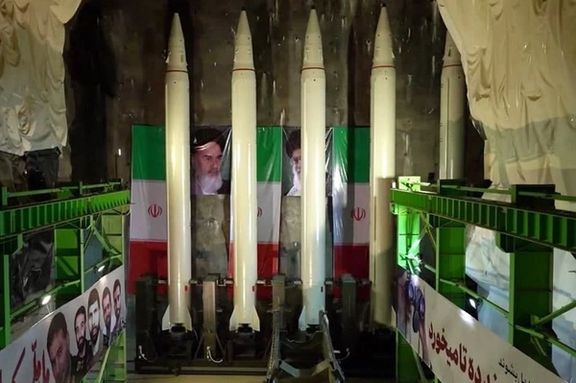
Iran’s top military commanders on Thursday spoke of a forceful response to an Israeli air strikes over the weekend as rhetoric around retaliation appears to have stiffened in recent days.

Iran’s top military commanders on Thursday spoke of a forceful response to an Israeli air strikes over the weekend as rhetoric around retaliation appears to have stiffened in recent days.
“You made yet another mistake and you’ll suffer. (Our response) will be unimaginable,” Islamic Revolutionary Guard Corps commander Hossein Salami said, referring to Israel’s attack last week.
Remarks by his deputy Ali Fadavi were yet harsher: “We can target everything the Israelis have in one operation,” he said, calling Iran's response "a certainty".
The near-simultaneous warnings by Iran’s two most senior IRGC commanders came as US secretary of state Antony Blinken spoke of some progress in talks for a ceasefire agreement between Iran-backed Lebanese Hezbollah and Israel.
An agreement would see the Lebanese army and UN peacekeeping forces replace Iran’s strongest regional ally Hezbollah.
Iranian officials are yet to comment on the prospect of such an agreement. But the mood in Tehran was telegraphed in the form of a message by IRGC foreign operations commander Esmail Qaani to Hezbollah leader Naim Qassem to congratulate him on his appointment as the group’s new secretary general.
“Your brothers in the Quds Force will stay by Hezbollah’s side until the evil tree of Zionism is uprooted and removed and Palestine and Jerusalem are liberated,” Qaani’s message read, according to Iran’s state-affiliated media.
The most senior cleric in the Supreme Leader’s office Mohammad Mohammadi Golpayegani also weighed in with menacing comments.
“Israel's recent attack on our country was a desperate action that will be met by a harsh and punishing response,” he said.
Reports on US media late on Thursday appeared to corroborate the messaging from Tehran.
The New York Times quoted three Iranian officials saying supreme leader Ali Khamenei has instructed the country’s Supreme National Security Council to prepare for a retaliatory attack on Israel.
Axios cited Israeli intelligence sources saying an Iranian attack may take place even before the US presidential election on November 5.
That attack, according to Axios, could be carried out from Iraqi territory and with help from Iran’s allied armed groups in that country.
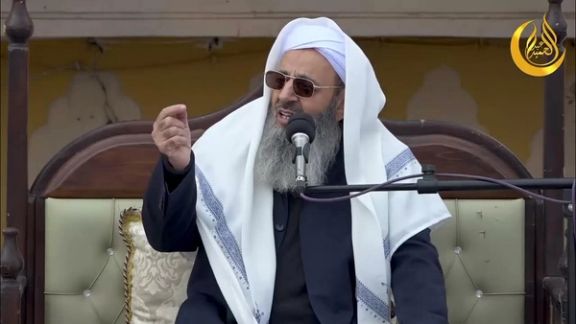
Iran's leading Sunni cleric Mowlavi Abdolhamid has welcomed the government’s appointment of a Sunni ethnic Balochi as governor of the Sunni-majority Sistan and Baluchestan Province.
Speaking to a group of citizens in Chabahar, one of the major cities of the Sunni-majority province, Abdolhamid briefly referred to the appointment of Mansour Bijar and said he was pleased with the appointment.
Before he was appointed governor, Bijar, a 50-year-old civil engineer, served as a development affairs coordination deputy to the governor of the province.
Bijar is the third from a religious and ethnic group to be appointed as governor by Pezeshkian’s government.
His appointment came after the appointment of a Sunni Kurd as the governor of Kordestan Province and an ethnic Arab as governor of the oil-rich Khuzestan Province.
Abdolhamid who wields much influence among the large Sunni, Balochi population of Sistan and Baluchestan and other Sunni-populated regions has repeatedly criticized the government for political, social, and religious discrimination against Sunnis.
Referring to the new governor’s appointment at the cabinet meeting Wednesday, Pezeshkian expressed hope that the appointment would help remedy the impoverished province’s problems while underlining that his government does not discriminate between the Persian-speaking and other ethnicities including Arabs, Kurds, and the Balochi.
During his campaign debates, Pezeshkian repeatedly criticized the unwritten ban on the appointment of Sunnis and women to higher government management positions but presumably under pressure from the Shia religious establishment, he proposed neither Sunnis nor women as candidates for ministerial positions in his cabinet.
Pundits say Shia sources of emulation (Grand Ayatollahs) who have always opposed the appointment of Sunnis to higher government positions are likely to be disappointed with Pezeshkian’s recent appointments.
Pezeshkian visited Qom Thursday to meet with several influential grand ayatollahs some of whom are known for their strong opposition to giving positions of high responsibility to Sunnis that they believe gives them supremacy over Shias. Conservative grand ayatollahs also strongly oppose women’s appointment as ministers.
No mention was made of discussion of the appointments in the official reports of these meetings.
In September the majority hardliners and ultra-hardliners of the Parliament also blocked the resignation of a Sunni Kurdish lawmaker, set to join Pezeshkian’s cabinet as a deputy. The Parliament’s hard stance sparked speculation over whether Pezeshkian would fight to keep the Sunni lawmaker in his cabinet or relent to hardliners’ pressure to omit them.
In a Friday sermon in Zahedan, the capital of Sistan-Baluchestan, Abdolhamid criticized the Parliament’s objection to Hosseinzadeh’s resignation and barring him from entering Pezeshkian’s cabinet although resignation of other lawmakers to join the cabinet had always been accepted before.
Sunnis are also impeded from running for the presidency. In June, the unelected 12-member Guardian Council, responsible for vetting candidates, blocked Jalal Jalalizadeh, a Sunni former representative of Sanandaj in the Iranian parliament, from running in the snap presidential elections.
Over the years, Sistan and Baluchestan has witnessed several major terrorist attacks by Jundullah and Jaish al-Adl, two closely related insurgent Balochi groups that advocate for an independent Balochistan that encompasses Baloch populations on both sides of the Iran-Pakistan border.
Last week, Jaish al-Adl, a group known for its history of ambushes, bombings, and other violent operations resulting in the deaths of both civilians and security personnel, took responsibility for the killing of ten border guards in Taftan Country of Sistan and Baluchestan.
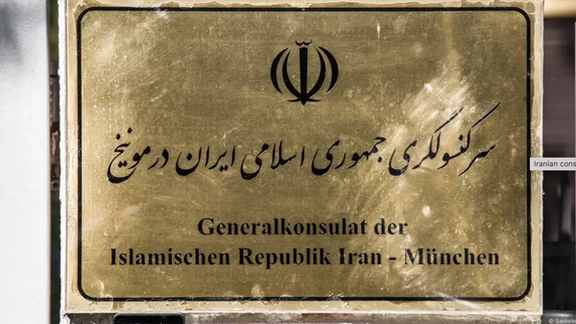
Germany moved one step closer to severing ties with Iran on Thursday, ordering all Iranian consulates to be shut down in response to the execution of the German-Iranian national Jamshid Sharmahd.
The move further mars the relationship between the Islamic Republic and Germany, Europe’s largest economy and Iran's biggest European trade partner. Iran's embassy in Berlin will remain open.
"Our diplomatic relations are already more than at a low point," German Foreign Minister Annalena Baerbock said in New York after Berlin recalled its ambassador to Tehran a day earlier.
Baerbock urged Brussels to put Iran’s Islamic Revolutionary Guard Corps (IRGC) on the European Union's terror list.
Germany downgraded relations with Tehran in the 1990s following the assassination of Kurdish-Iranian dissidents in Berlin. Tensions eased a few years later following the election of reformist Mohammad Khatami, who embarked on a charm offensive to rebuild relations with the European Union.
The EU announced on Wednesday following Sharmahd's execution that it was considering "targeted and significant measures." It provided no further details.
In its statement, the EU condemned the execution of the German-Iranian national and expressed full solidarity with Germany. Similar remarks were made by European Union Foreign Policy Chief Josep Borrell on his X account on Tuesday.
Iran executed the 68-year-old dissident who was a software developer and California resident on Monday. He was abducted by Iranian agents during a visit to the United Arab Emirates in 2020 and forcibly taken to Iran. In February 2023, Iran's judiciary sentenced him to death on charges of endangering national security.
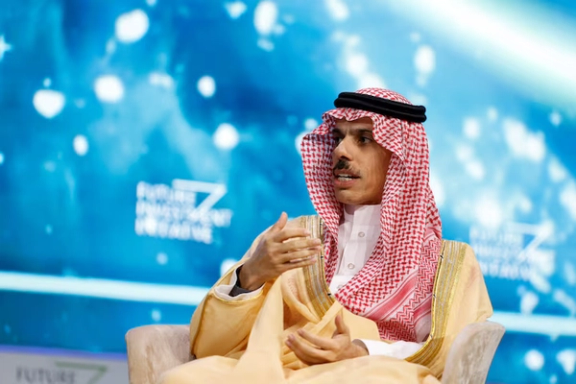
Saudi Arabia’s top diplomat on Thursday said the kingdom's relationship with regional arch-rival Iran was on the mend and Riyadh hoped Tehran would take steps to defuse its simmering conflict with Israel.
“What I hear from the Iranians is that they are indeed very much keyed into the fact that a continuing cycle of escalation is not in their interest,” Faisal bin Farhan al Saud said at a major investment conference in the Saudi capital.
“I do hope that they are translating that into actually practical steps,” he added, adding that Saudi diplomacy aims at heading off future conflicts.
Iranian foreign minister Abbas Araghchi toured Arab capitals this month to drum up support ahead of an Israeli military response to a missile barrage Tehran launched on the Jewish state on Oct. 1.
That attack came over the weekend and killed four Iranian soldiers and a civilian but appeared to bypass the airspace of Arab countries astride the Persian Gulf.
China brokered a rapprochement between the regional heavyweights in March 2023 which restored their diplomatic ties and cooled somewhat the conflicts pitting Riyadh and its armed allies against Iran-backed armed groups in Lebanon, Yemen and Iraq.
Saudi Arabia has moderated its tough stance toward Iran following a 2019 missile strike on its key refinery at Abqaiq, which briefly shut down more than 5% of global oil supply. Iran denied involvement.
Discussing broader regional tensions, Prince Faisal urged all involved parties to act cautiously, saying: “The only way for us to find a pathway…is for everybody to make a conscious decision that further escalation is risky for all parties.”
“Without finding a pathway to a ceasefire in Gaza, I think we continue to risk intended and unintended cycles of escalation."
Saudi Crown Prince Mohammed bin Salman said this year that the kingdom would not normalize its relations with Israel without the establishment of a Palestinian state.
The Biden Administration had been working for months to broker a peace agreement between Saudi Arabia and Israel. A deal appeared close last year but lapsed after October 7, 2023, when Iran-backed Palestinian militants led by Hamas attacked Israel, sparking more than a year of war.
Turning to Saudi Arabia’s relationship with the United States, Bin Farhan said the strategic partnership remains strong and beneficial, particularly in security and economic matters.
Despite initial turbulence between the United States and Saudi Arabia at the beginning of President Joe Biden's term, Prince Faisal said ties were now better than ever.
“Today, the working relationship with the US is among the best we’ve ever had, including in the national security space,” he said.
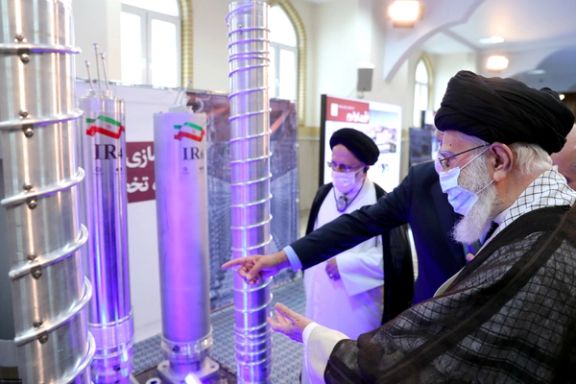
A hardline Iranian newspaper affiliated with the Revolutionary Guards has called for building nuclear weapons as a form of deterrence following Israeli air strikes on October 26.
In an editorial penned by the editor-in-chief of the Javan newspaper, Gholamreza Sadeghian, the IRGC-aligned outlet categorized four types of deterrence and said that the Islamic Republic has achieved the first three: political, economic, and military.
The author referred to the last type as nuclear deterrence, writing: "We know that the enemy is concerned with Iran's deterrence in this regard.”
“While we have emphasized that we are not pursuing nuclear weapons, the capability to acquire them and establish deterrence is another matter—one that the world recognizes in Iran, with estimates suggesting we could achieve this within a week if we chose to do so."
The UN nuclear watchdog has warned several times that Iran may be weeks away from having enough weapons-grade nuclear material.
Earlier this year at the Aspen Security Forum, US Secretary of State Antony Blinken warned that Tehran can produce the necessary fissile material for an atomic bomb in as little as a week or two.
“Instead of being at least a year away from having the breakout capacity of producing fissile material for a nuclear weapon, it is now probably one or two weeks away from doing that,” he said, clarifying that Iran has not yet produced a weapon, which would take far more time.
The editorial from the Javan newspaper, a mouthpiece for the IRGC, indicates a growing sentiment within certain circles of the Iranian establishment, advocating for the acquisition of nuclear weapons as a means of deterrence.
It has heightened against the backdrop of tensions with its nemesis Israel, widely believed to possess at least 90 nuclear warheads, according to organizations such as the Arms Control Association.
Earlier in October, a group of Iranian lawmakers called on Iran's Supreme National Security Council to review the country's defense doctrine and consider building nuclear weapons. They argued that Supreme Leader Ali Khamenei can reconsider his religious ban on nuclear weapons on the grounds that the circumstances have changed.
Iranian officials have repeatedly asserted that the country's nuclear program is peaceful, referring to a religious ruling by Khamenei prohibiting weapons of mass destruction, including nuclear bombs.
Tehran’s stockpile of uranium, currently enriched to 60%, could potentially be refined to weapons-grade 90% in a very short time. The shift in doctrine would likely be a signal of Iran's willingness to develop nuclear weapons if Israeli military actions threaten its core interests.
In May, an adviser to Iran's supreme leader said that Iran would reconsider its nuclear doctrine if Israel threatens its existence. There are also claims by Iranian officials that Iran might already possess a nuclear weapon.
In August, Iran International reported that Tehran is intensifying efforts on its secretive nuclear weapons program, bringing the country closer than ever to developing a nuclear bomb.
In early October, pro-establishment voices on Persian-language social media claimed that a recent earthquake in Iran’s Semnan province was actually a covert nuclear test as ultra-hardliners rejoiced over the claims of Iran's alleged nuclear test.
Alex Vatanka, founding director of the Iran Program at the Middle East Institute, told Iran International's Eye for Iran this month that Tehran is nervous about potential Israeli strikes on its nuclear facilities and is using its controversial atomic program as a leverage.
According to Jack Roush, a research associate at United Against Nuclear Iran (UANI), the Strategic Council on Foreign Relations -- a little-known but influential body handpicked by Khamenei-- may provide the spur the Supreme Leader needs to ditch his avowed refusal of nuclear weapons and reach for the ultimate deterrent.
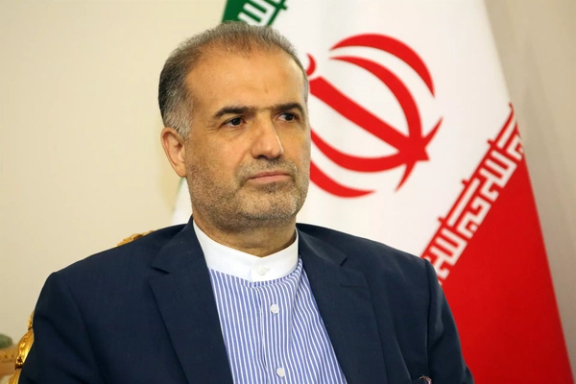
Iran's Ambassador to Russia says that Tehran does not anticipate Moscow taking on a mediating role between Iran and the European Union in negotiations concerning Iran's nuclear program.
"One cannot expect Russia to mediate between us and Europe, as Russia itself is in a state of war and deadlock with European countries and the international structure," Kazem Jalali told Sputnik.
In the interview, Jalali said that Iran remains untroubled by its neighboring countries but is increasingly wary of foreign interference within the region, which he says complicates regional relations.
“The presence of foreigners in our region can complicate relations, and Western countries generally try to intervene in the internal affairs of regional countries to shift everything in their favor,” Jalali added.
He said that Iran’s nuclear activities continue under International Atomic Energy Agency (IAEA) oversight and “if major powers do not engage in excessive demands, the nuclear issue of the Islamic Republic of Iran is resolvable.”
The 2015 Joint Comprehensive Plan of Action (JCPOA) once restricted Iran's nuclear ambitions, but the US withdrew from the accord in 2018 under then-President Donald Trump, who re-imposed sanctions on Iran’s oil and banking sectors.
These restrictions have persisted, with the US and regional allies pressing Iran for compliance guarantees before considering any sanction relief. Iran, meanwhile, has expanded uranium enrichment beyond JCPOA limits, which has fueled concerns among Western powers about potential weaponization—a claim Tehran denies.
Mohammad Eslami, head of Iran's Atomic Energy Organization said on Wednesday that Russia remains dedicated to assisting Iran in developing phases two and three of the Bushehr nuclear power plant.
According to Eslami, Russian President Vladimir Putin assured Iran of Russia’s commitment to completing these projects, which are part of Iran’s broader nuclear energy strategy aimed at alleviating domestic energy shortfalls.
Iran's dependence on nuclear energy arises from decades of limited investment in alternative energy sources, especially renewables, resulting in a lack of diversification that makes the country susceptible to energy shortages, particularly given its global isolation.
Currently, Russia is Iran's sole partner in its nuclear industry. The Bushehr power plant, launched by Russia in 2011, operates a single reactor producing 1,000 megawatts, which accounts for less than two percent of Iran's total electricity output. However, construction on the second and third phases of the Bushehr Nuclear Power Plant has reportedly gained momentum.
The Bushehr reactor remains unaffected by the ongoing nuclear dispute between the West and Iran, as Russia controls the nuclear fuel cycle for this facility.